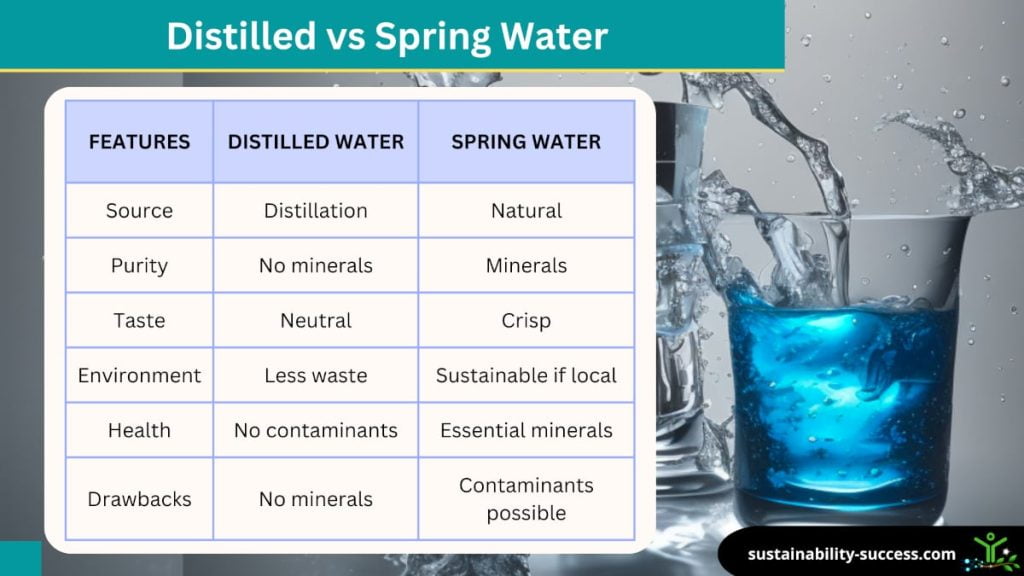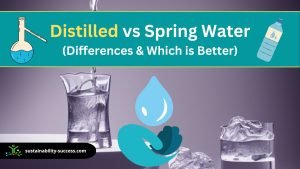Distilled vs spring water makes for an interesting debate. Knowing the key differences will help you decide which type of water is best for your individual needs based on the various use cases and benefits.
When it comes to choosing between distilled water and spring water, several factors should be taken into consideration. Distilled water is water that has been heated to the point of evaporation, leaving behind any solids or minerals. It has a very neutral taste since no minerals are present, and does not contain any bacteria which makes it safe for consumption. On the other hand, spring water is collected from a natural or underground source and contains small amounts of dissolved minerals like calcium and magnesium.
Overall, considering their different health benefits, the choice of drinking one or the other is personal preference. For those that are looking for a more natural mineral content in their drinking water, then spring water would be the better option.
However, if you are looking for purer drinking water that is free of any contaminants, or if you need it for appliances, then distilled water is the better choice.
Comparing Distilled vs Spring Water
Here’s a comparison table of distilled vs spring water:

At first glance they seem like relatively similar types on paper but what are some pros and cons associated with drinking each option? Standard advice dictates paying attention to how each one tastes as well as understanding how much weight you place on natural mineral content versus purity levels.
Now, let’s have a look more in detail at both distilled and spring water!
What is Distilled Water?
Distilled water, at its most basic level, is just water that has been brought to a boiling point and then allowed to condense. This process of distillation removes any impurities, such as bacteria, salts, and other minerals found in regular tap water. It essentially creates a blank slate of near-pure water without any additional elements present.
This same process is used throughout the industry to produce pure drinking water, and even in lab-grade processes where specific levels of purity are required. Be aware that purified water is not the same as distilled, you can learn the differences of purified vs distilled water here.
Distilled water can also occur naturally, in fact, rain is naturally distilled water that, if there wasn’t any pollution in the air, would be 100% pure.
Distilled water for appliances
In terms of household use, distilled water does have an advantage over filtered or plain old tap water; it’s free from any chemical additives or other pollutants often found in H20 from your local faucet.
Using distilled water for your appliances, is essential to keep them functional long term, because distilled water doesn’t contain minerals and doesn’t leave behind potentially damaging residues.
How to make distilled water at home?
The easiest and hassle free way to make distilled water at home is by using a water distiller like the one below:
DC HOUSE Water Distiller
★★★★★ 4.3
Are you tired of feeling like you’re drinking a chemistry experiment every time you take a sip of tap water? Say goodbye to those worries with the DC HOUSE Water Distiller! This baby turns ordinary tap water into pure, crystal-clear H2O that’ll make your taste buds sing. Plus, it’s so easy to use, even your dog could figure it out (well, maybe not, but you get the idea). So ditch the bottled water and start distilling like a boss with DC HOUSE!
If instead you want to make distilled water at home DIY, you’ll need a pot, a heat-safe bowl, and tap water. Fill the pot with water, and place the bowl inside, making sure it floats. Bring the water to a boil and cover the pot with a lid, leaving a small gap for steam to escape. As the water boils, the steam will condense on the lid and drip down into the bowl as distilled water. That’s it! You now have pure, distilled water ready to use.
Benefits of Drinking or using Distilled Water
If you’re considering drinking distilled water, here are some potential benefits you might be interested in:
- Clean and pure: Distillation removes impurities and contaminants, leaving you with water that’s free from minerals, metals, and chemicals.
- Tasty: Some people find that distilled water tastes better than tap water, which can sometimes have a chlorine or metallic flavor.
- Hydrating: Like any water, drinking distilled water can help keep you hydrated.
- Health potential: While more research is needed, some studies suggest that drinking distilled water may offer health benefits, such as reducing the risk of certain diseases.
- Appliance-friendly: Distilled water doesn’t leave mineral deposits behind, which means it can help prolong the life of appliances like coffee makers and humidifiers.
It’s important to keep in mind that distilled water also has some potential drawbacks. For instance, it lacks the beneficial minerals found in natural water sources, which could be a concern for people with mineral deficiencies.
As with any dietary change, it’s wise to do your own research and talk to a healthcare professional before making any major changes.
What is Spring Water?
Spring water (or mineralized spring water), on the other hand, originates off either underground aquifers or sources protected by artesian wells. Due to their subterranean nature, spring waters contain natural trace minerals like calcium and magnesium that provide a unique flavor profile different from regular bottled or tap waters.
In order to qualify their product as true “spring” water, brands meet rigorous standards for quality control that must be maintained year round. Whenever the processing steps involve bottling directly from the source itself (for instance a mountain stream) then it will have a higher likelihood of meeting these strict requirements.
Please note that spring water is different from purified water, in fact the latter is going through a purification process using water purifiers, while spring water is naturally occurring.
Benefits of Drinking Spring Water
Is spring water good for you? Let’s talk about the benefits of drinking spring water, grab a glass and let’s get hydrated!
- Rich in minerals and electrolytes that can support nerve and muscle function, hydration, and bone health.
- Helps to keep you hydrated and energized
- May have a crisp and refreshing taste
- 100% Natural
Spring water by itself would be an eco-friendly option for drinking, however, unless you leave near a natural source, spring water generally comes bottled. Unfortunately, bottled water is not an environmentally sustainable choice, because it produces a lot of plastic and emissions due to transport.
The best solution for this would be to use a water filter or purifier to cleanup tap water instead. There are also new green tech examples that in the future could improve a lot those processes.
As an alternative, if you prefer to drink spring water, then try to purchase it in bulk and with large bottles, then you can get a refillable water bottle for daily use. This would at least reduce plastic pollution. This is the best reusable water bottle to have your healthy spring water always with you:
Best Refillable Water Bottle: IRON °FLASK
★★★★★ 4.8
Say goodbye to those wasteful plastic water bottles with IRON °FLASK! This sleek refillable water bottle is made with premium 18/8 stainless steel, keeping your drinks cold for up to 24 hours and hot for up to 12 hours. With three different 100% leak proof lids, you’ll have the flexibility to take it with you on the go. Plus, it’s environmentally friendly and 100% BPA-free. You’ll never want to go back to bottled water again!
FAQ
Can drinking distilled water be part of a daily routine?
Distilled water is generally safe to drink daily, but it should be consumed in moderation. While there are no major health drawbacks from drinking it regularly, it does not contain any minerals that our bodies need. To ensure adequate nutrition and electrolyte balance, drinking other types of water or adding electrolyte supplements can help.
What are the drawbacks of using distilled water?
Distilled water is not recommended for regular consumption because it can lead to mineral deficiencies due to its stripped-down composition. It lacks essential minerals like calcium, sodium and magnesium which are necessary for cellular and metabolic functions. Furthermore, drinking too much distilled water can also cause an electrolyte imbalance in the body.
Why don’t medical centers utilize distilled water?
Hospitals do not use distilled water due to its lack of essential minerals and nutrients. Distilled water is comprised of only H2O, leaving it lacking in important components like calcium, sodium, and magnesium. These are necessary for humans to maintain their health and wellness. As such, hospitals utilize filtered or purified water instead which preserves these vital elements.
Conclusion
DISTILLED vs SPRING WATER
| Feature | Distilled Water | Spring Water |
|---|---|---|
| Source | Created by distillation | Comes from natural springs |
| Purity | No impurities or minerals | Contains natural minerals and electrolytes |
| Taste | Neutral flavor | May have a crisp, refreshing taste |
| Environmental Impact | Less packaging and transportation if made at home | Can be more sustainable if sourced locally |
| Health Benefits | Can help reduce contaminants | Contains minerals that support bodily functions |
| Potential Drawbacks | Lacks beneficial minerals | May contain contaminants or impurities |
Overall, it is clear that distilled water and spring water both offer unique benefits. While distilled water may be the better choice for those looking for purer drinking water free of any contaminants, spring water would be a better option for those that are looking for a more natural mineral content in their drinking water.
In the end, the choice between distilled vs spring water boils down to personal preference and should not be taken lightly. Both waters have distinct differences that can impact your health depending on your own individual needs. So, when it comes to choosing between distilled vs spring water, make sure you take all factors into consideration before making a decision.



